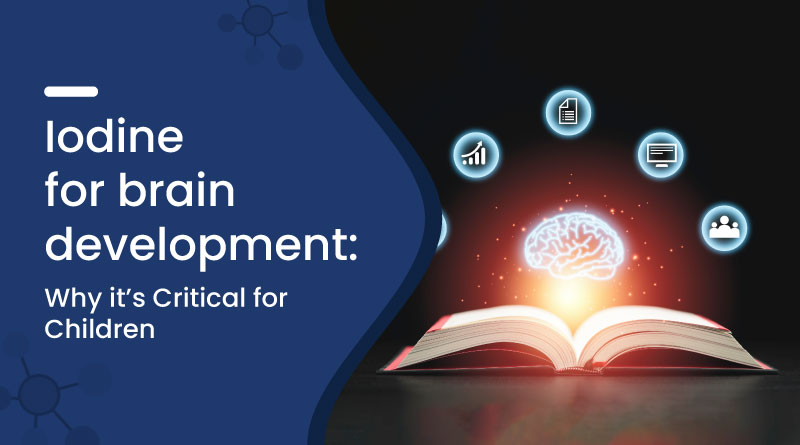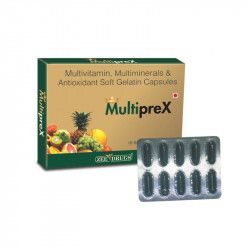Iodine for Brain Development in Children – Importance & Benefits


Iodine for brain development is one of the most overlooked yet essential nutrients in early childhood. It supports brain growth and memory. Unfortunately, iodine deficiency still affects millions of children globally, leading to learning difficulties and developmental delays. In this blog, we’ll explore why iodine is crucial for children's brain development, how deficiency affects the body, and how to ensure adequate intake.
What Role Does Iodine Play in Brain Development?
Iodine helps produce thyroid hormones T3 and T4. These hormones regulate brain growth, especially during pregnancy and the early years of life. Adequate iodine supports:
- Formation of neurons and brain tissue
- Development of cognitive skills
- Maintenance of memory and learning capacity
Without enough iodine, the brain cannot develop properly—leading to intellectual disabilities, stunted growth, and lower IQ levels.
Why Is Iodine Deficiency Dangerous for Children?
Iodine deficiency during critical growth years can cause irreversible damage. Children with low iodine levels may face:
- Delayed mental development
- Poor school performance
- Problems with speech and motor skills
- Higher risk of goiter (neck swelling from thyroid enlargement)
Severe deficiency may cause cretinism. That’s why iodine for brain development is not optional—it’s a non-negotiable nutrient for growing children.
When Is Iodine Most Important for Brain Development?
The first 1,000 days of life—from conception to age two—are the most critical. During this window:
- The brain grows rapidly
- Neurons multiply and form complex connections
- Thyroid hormones shape the nervous system
If a pregnant woman is deficient in iodine, her child may suffer from delayed mental development right from birth. Even after birth, toddlers need enough iodine for continued cognitive and motor development.
How Can Parents Ensure Children Get Enough Iodine?
Ensuring adequate iodine is easy with the right dietary choices:
- Iodized salt – The simplest and most effective source
- Dairy products – Milk, yogurt, and cheese contain good iodine levels
- Eggs and fish – Especially sea fish like cod and tuna
- Whole grains and fortified foods
For young children and infants, the mother’s iodine intake during pregnancy and breastfeeding is vital. In areas with known deficiency, iodine supplementation may be recommended by doctors.
What Are the Signs of Iodine Deficiency in Children?
Watch out for these early warning signs:
- Fatigue and sluggishness
- Difficulty learning new concepts
- Puffy face or swelling around the neck
- Poor growth and weak muscles
- Cold sensitivity
If any of these symptoms are present, a thyroid function test and iodine level check should be conducted immediately.
How Common Is Iodine Deficiency in India and Other Countries?
While iodine fortification programs have helped, iodine deficiency remains a public health issue—especially in:
- Hilly and inland regions (where soil is iodine-deficient)
- Rural areas with limited access to iodized salt
- Families with low dietary diversity
Severe deficiency can cause cretinism—extreme physical and mental delay. India has made progress, but pockets of deficiency still exist, especially among children and pregnant women.
Frequently Asked Questions
Q. Why is iodine important for children’s brain development?
A. Iodine supports the production of thyroid hormones that are critical for brain growth, memory, and learning.
Q. How can I know if my child has iodine deficiency?
A. Signs include fatigue, poor memory, slow learning, and swelling in the neck. A doctor can confirm it with a thyroid test.
Q. What foods are rich in iodine?
A. Iodized salt, dairy, eggs, fish, and seaweed are excellent sources of iodine.
Q. Can pregnant women affect the baby’s brain development with iodine deficiency?
A. Yes, low iodine in pregnancy can lead to delayed brain development and lower IQ in the baby.
Q. Is iodine supplementation safe for children?
A. Yes, but only under medical supervision—especially in areas with known deficiency or dietary limitations.
Conclusion
Iodine for brain development in children is a critical public health priority. Without it, children face lifelong challenges with learning, growth, and mental well-being. By ensuring adequate iodine intake through diet and awareness, parents and caregivers can lay the foundation for sharp minds and healthy futures. Don't wait for symptoms—make iodine a part of your child’s nutrition strategy today.
Ginseng Extract (42.5 mg) + Vitamin A (2500 IU) + Vitamin B1 (1 mg) + Vitamin B2 (1.5 mg) + Vitamin B3 (10 mg) + Vitamin B5 (5 mg) + Vitamin B6 (1 mg) + Vitamin B12 (0.001 mg) + Vitamin C (50 mg) + Vitamin D3 (200 IU) + Vitamin E (5 mg) + Folic Acid (0.15 mg) + L-Arginine (25 mg) + Calcium (75 mg) + Phosphorus (58 mg) + Ferrous Fumarate (30 mg) + Zinc (10 mg) + Magnesium (3 mg) + Potassium (2 mg) + Manganese (0.5 mg) + Copper (0.5 mg) + Iodine (0.1 mg) + Carbohydrate (100 mg) + Protein (20 mg) + Fat (380 mg) + Energy (4.23 kcal)
15 Capsules in 1 strip
Ginseng Extract (42.5 mg) + Vitamin A (2500 IU) + Vitamin B1 (1 mg) + Vitamin B2 (1.5 mg) + Vitamin B3 (10 mg) + Vitamin B5 (5 mg) + Vitamin B6 (1 mg) + Vitamin B12 (0.001 mg) + Vitamin C (50 mg) + Vitamin D3 (200 IU) + Vitamin E (5 mg) + Folic Acid (0.15 mg) + L-Arginine (25 mg) + Calcium (75 mg) + Phosphorus (58 mg) + Ferrous Fumarate (30 mg) + Zinc (10 mg) + Magnesium (3 mg) + Potassium (2 mg) + Manganese (0.5 mg) + Copper (0.5 mg) + Iodine (0.1 mg) + Carbohydrate (100 mg) + Protein (20 mg) + Fat (380 mg) + Energy (4.23 kcal)
15 Capsules in 1 strip
Vitamin A (1600 IU) + Vitamin E Acetate (1 IU) + Vitamin D3 (100 IU) + Vitamin B1 (1 mg) + Vitamin B2 (1 mg) + Vitamin B6 (0.5 mg) + Vitamin B12 (0.0005 mg) + Calcium Pantothenate (1 mg) + Niacinamide (15 mg) + Calcium (75 mg) + Phosphorus (58 mg) + Folic Acid (0.05 mg) + Copper Sulphate (0.045 mg) + Iodine (0.075 mg) + Potassium (1 mg) + Magnesium (1 mg) + Manganese (0.5 mg) + Sodium Molybdate (0.1 mg)
10 Capsules in 1 Strip
Omega 3 Fatty Acids (EPA 90 mg + DHA 60 mg) + Green Tea Extract (10 mg) + Ginseng (42.50 mg) + Ginkgo Biloba Extract (10 mg) + Grape Seed Extract (15 mg) + Glutathione (10 mg) + Lactic Acid Bacillus (500 Lacs Spores) + Citrus Bioflavonoids (20 mg) + Natural Mixed Carotenoids (11.33 mg, 10%) + Vitamin D3 (200 IU) + Wheat Germ Oil (25 mg) + Vitamin K1 (10 mcg) + Vitamin B6 (1 mg) + Vitamin B12 (1 mcg) + Thiamine (1.4 mg) + Niacinamide (18 mg) + Ascorbic Acid (40 mcg) + Folic Acid (120 mcg + 30 mcg) + Choline Hydrogen Tartrate (25 mg) + Lutein (250 mcg, 10%) + Piperine (5 mg) + Calcium (20 mg) + Phosphorous (15.45 mg) + Iron (10 mg) + Zinc (12 mg) + Iodine (120 mcg) + Magnesium (30 mg) + Manganese (1.5 mg) + Copper (0.5 mg) + Chromium (50 mcg) + Molybdenum (25 mcg) + Selenium (20 mcg) + Potassium (4 mg) + Chloride (3.6 mg)
15 Capsules in 1 strip
Recent Blogs
Disclaimer : Zeelab Pharmacy provides health information for knowledge only. Do not self-medicate. Always consult a qualified doctor before starting, stopping, or changing any medicine or treatment.
Related Products
Need Medicines Quick?
Share location to check quick delivery serviceability.
Change Location
Location Access Needed
Your location appears to be blocked or disabled.
Please enable the location from your browser or
device settings.

₹ 0
0
Items added
Quick Links
Categories
Our Policies
2026 Copyright By © Zeelab Pharmacy Private Limited. All Rights Reserved
Our Payment Partners

 Added!
Added!
|
|

















